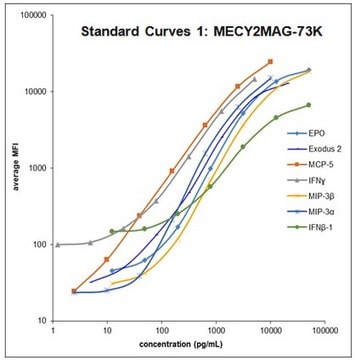MCYTMAG-70K-PX32
MILLIPLEX® Mouse Cytokine/Chemokine Magnetic Bead Panel - Premixed 32 Plex - Immunology Multiplex Assay
Simultaneously analyze multiple cytokine and chemokine biomarkers with Bead-Based Multiplex Assays using the Luminex technology, in mouse serum, plasma and cell culture samples.
Synonym(s):
Luminex® Mouse cytokine immunoassay, Millipore Mouse cytokine immunoassay, Mouse cytokine Multiplex Assay
About This Item
Recommended Products
Quality Level
species reactivity
mouse
manufacturer/tradename
Milliplex®
assay range
accuracy: 85-107%
standard curve range: 3.2-10,000 pg/mL
technique(s)
multiplexing: suitable
compatibility
configured for Premixed
detection method
fluorometric (Luminex xMAP)
shipped in
wet ice
Related Categories
General description
To identify specific cytokines involved in any inflammatory or immune response, it might be necessary to screen panels of cytokines, often requiring some level of automation and/or high throughput. Beads can make the process of automation and high throughput screening easier with features such as walk-away washing. Advantages even outside automation include:
More flexible plate and plate washer options
- Improved performance with turbid serum/plasma samples
- Assay results equivalent to non- beads
- Automated washing avoids many problems associated with vacuum filtration washing
MILLIPLEX® Mouse Cytokine / Chemokine panel enables you to focus on the therapeutic potential of cytokines as well as the modulation of cytokine expression. Coupled with the Luminex® xMAP® platform in a bead format, you receive the advantage of ideal speed and sensitivity, allowing quantitative multiplex detection of dozens of analytes simultaneously, which can dramatically improve productivity.
Panel Type: Cytokines/Chemokines
Specificity
Cross-reactivity between the antibodies and any of the other analytes in this panel is non-detectable or negligible.
Application
- Analytes: Eotaxin/CCL11, G-CSF, GM-CSF, IFN-γ, IL-1α, IL-1β, IL-2, IL-3, IL-4, IL-5, IL-6, IL-7, IL-9, IL-10, IL-12 (p40), IL-12 (p70), IL-13, IL-15, IL-17, IP-10, KC, LIF, LIX, MCP-1, M-CSF, MIG, MIP-1α, MIP-1β, MIP-2, RANTES, TNF-α, VEGF
- Recommended Sample type: plasma, serum, or cell culture supernatant
- Recommended Sample dilution: 1:2 diluted plasma or serum
- Assay Run Time: Overnight or one day. For best results an overnight incubation is recommended.
- Research Category: Inflammation & Immunology
Packaging
Storage and Stability
Other Notes
Legal Information
Disclaimer
Signal Word
Danger
Hazard Statements
Precautionary Statements
Hazard Classifications
Acute Tox. 4 Dermal - Acute Tox. 4 Inhalation - Acute Tox. 4 Oral - Aquatic Chronic 2 - Eye Dam. 1 - Skin Sens. 1 - STOT RE 2
Target Organs
Respiratory Tract
Storage Class Code
10 - Combustible liquids
Certificates of Analysis (COA)
Search for Certificates of Analysis (COA) by entering the products Lot/Batch Number. Lot and Batch Numbers can be found on a product’s label following the words ‘Lot’ or ‘Batch’.
Already Own This Product?
Find documentation for the products that you have recently purchased in the Document Library.
Our team of scientists has experience in all areas of research including Life Science, Material Science, Chemical Synthesis, Chromatography, Analytical and many others.
Contact Technical Service











